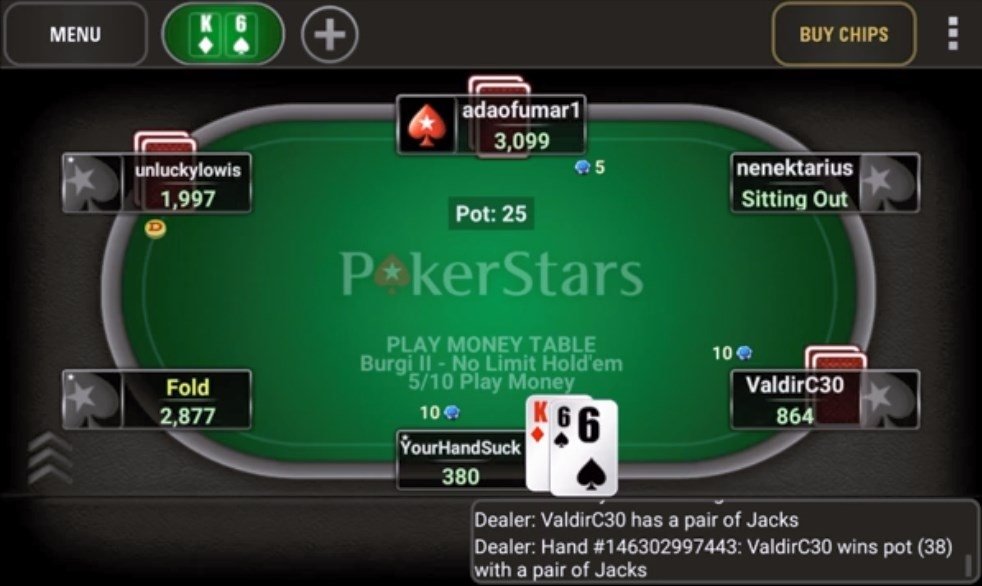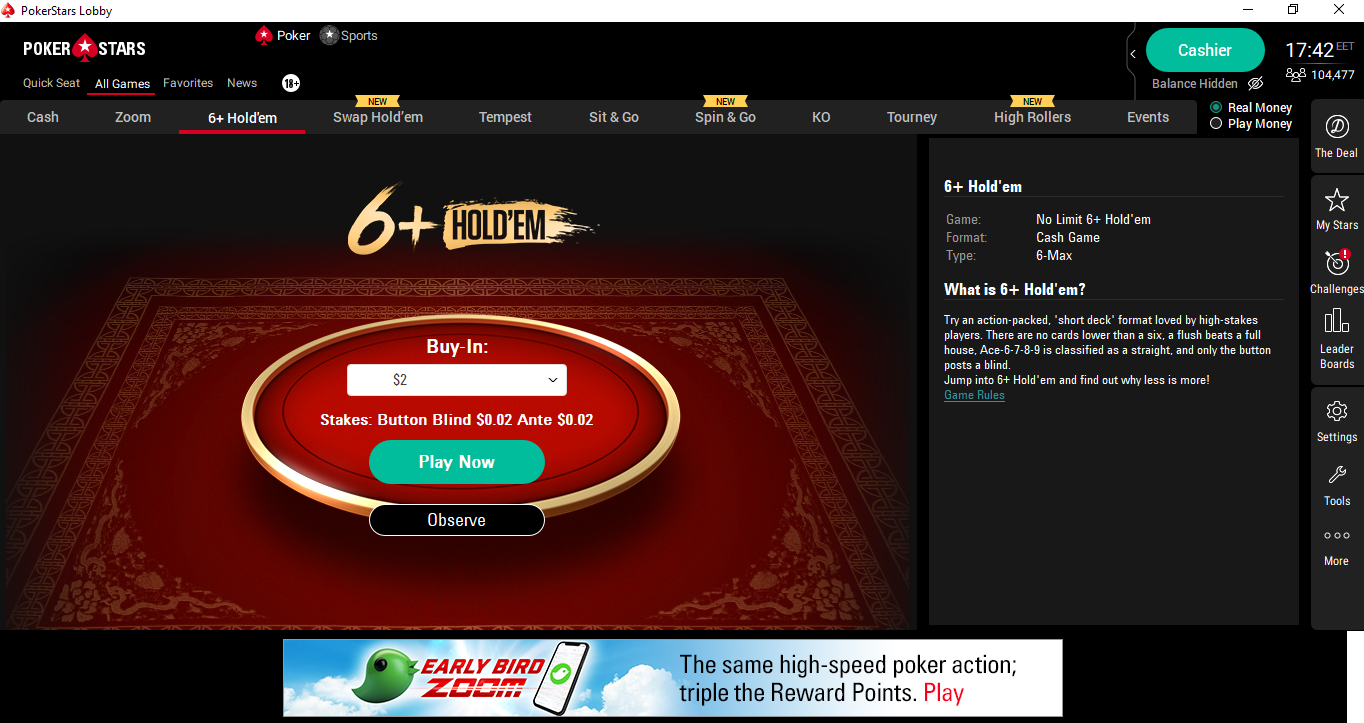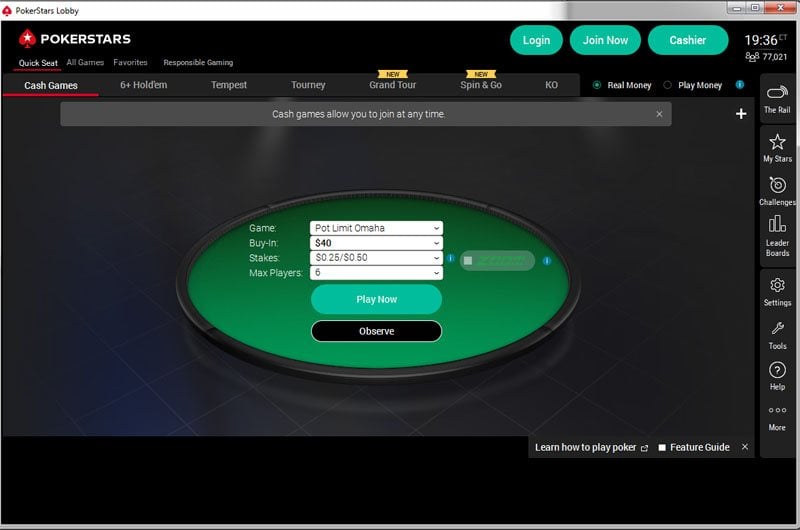Table Of Contents
What is Short Deck Poker?
PokerStars launched online 6+ Hold’em cash games back in January. The game uses a “short deck” with cards lower than a six removed from the deck. It plays out like regular hold’em, with a few exceptions. All players post an ante, and a flush beats a full house. It was a poorly-kept secret for months, but on Tuesday PokerStars finally launched “6+,” a game also known in poker circles (and on the PokerStars blog) as 6+Hold’em. 6+ Hold’em follows. PokerStars has launched its long-awaited new game, called 6+, its version of the game known as Short Deck Poker or Six Plus Hold’em. The game is now live in Denmark, Estonia and for free-play on the dot-net client, pokerfuse can exclusively reveal.
Short-deck poker (also known as six-plus hold'em) is a new variation of traditional Texas hold'em that mostly follows the same rules albeit with a significant difference.
Short-deck poker uses a smaller 36-card deck rather than the full 52-card deck.
Most first heard of short-deck poker after it was introduced among the mix in the high-stakes cash games in Macau.
Play Short-Deck Poker Online6+ Short-deck poker is available online on the following websites:
'>Short-Deck Poker Rules
Before we discover how to play short-deck poker, let's see how to get to the 36-card deck needed to play a game of 6+ hold'em.
The 36-card deck in use in poker short deck is created by removing the 2xs, 3xs, 4xs, and 5xs from the deck (16 cards).
That leaves the 6xs up through the Kxs as well as the Axs.
What about the Aces?
As in regular hold'em, in short-deck poker the aces still count as high or low when making straights.
The lowest possible straight in a game of short-deck poker is Ax9x8x7x6x (think of the ace as essentially replacing the missing 5x).
Poker short-deck is played similarly to regular hold'em.
Each player receive two hole cards and use them in combination with five community cards to create the best possible hand.
A game of short-deck poker features four streets of betting:
- Pre-flop
- Flop
- Turn
- River
However, there are some differences in the poker short-deck poker that you should know about before playing.
Short-Deck Poker Hand Rankings
Short-deck poker can be played according to the exact same rules as regular Texas Hold'em.
The betting can be fixed-limit or no-limit (although most often the game is played no-limit), and the same hand rankings can be used as follows:
| Hand Ranking | Hand Name | Poker Hand |
|---|---|---|
| Lowest | High card | Kx6x9x8xQx |
| One pair | K♦K♠5x8xQx | |
| Two pair | K♦K♠6♥6♦Qx | |
| Three-of-a-kind | K♦K♠K♥6♦Qx | |
| Straight | A♠6♣7♥8♥9♦ | |
| Flush | K♦J♦10♦6♦9x | |
| Full house | K♦K♠K♥6♦6♠ | |
| Four-of-a-kind | K♦K♠K♥K♦6x | |
| Straight flush | 6♦7♦8♦9♦ | |
| Highest | Royal flush | 10♦J♦Q♦K♦A♦ |
For more info about the hand rankings in poker and which hand wins, visit our guide to poker hands.
Alternative Short-Deck Hand Rankings
Short-deck poker is played often employing a different hand ranking system. Here are the alternate hand rankings for short-deck poker (note the differences in bold):
| Hand Ranking | Hand Name | Poker Hand |
|---|---|---|
| Lowest | High card | Kx6x9x8xQx |
| One pair | K♦K♠5x8xQx | |
| Two pair | K♦K♠6♥6♦Qx | |
| Straight | A♠6♣7♥8♥9♦ | |
| Three of a kind | K♦K♠K♥6♦Qx | |
| Full house | K♦K♠K♥6♦6♠ | |
| Flush | K♦J♦10♦6♦9x | |
| Four of a kind | K♦K♠K♥K♦6x | |
| Straight flush | 6♦7♦8♦9♦ | |
| Highest | Royal flush | 10♦J♦Q♦K♦A♦ |
As you can see, following these alternate poker short deck hand rankings a three-of-a-kind beats a straight (instead of vice-versa), and a flush beats a full house (instead of vice-versa).
Why a Different Hand Rankings?
These changes were introduced the because the removal of cards from the standard deck alter the probabilities of making certain hands.
For example, with only nine suited cards (instead of 13), a flush is harder to make in shord-deck poker than in regular hold'em.
Six-Plus Hold'em Variation — The Deal (Fifth Street)
One other popular variation often introduced in six-plus hold'em has to do with the way the river is dealt.
The game can be played according to the same procedure followed in regular hold'em, with the community cards coming in the same way — flop (three cards), turn (one card), and river (one card) — and betting rounds after each street.
More often, though, instead of a river card being dealt to complete a five-card board, players are each dealt a third hole card instead.
Players then make their five-cardpoker hands by using exactly two of their three hole cards and three of the four community cards.
The building of hands resembles the procedure followed in Omaha poker where players must use two of their four hole cards plus three board cards to make a five-card poker hand.
Short-Deck Poker Basic Strategy



As you might imagine, the removal of low cards and use of the 36-card deck makes it more likely to make higher value hands, a change that tends to introduce more action.
You should adjust your thinking about relative hand values from what they are used to in regular hold'em.
The smaller deck makes it easier to make two-pair hands, which means a hand like top pair-top kicker is no longer as strong in six-plus hold'em as it is in regular hold'em.
Straights and full houses are also easier to make in six-plus hold'em than in the regular version of the game (a reason for the alternate hand rankings).
The odds of hitting certain draws change, too, in short-deck pokr.
Just to highlight one example, filling an open-ended straight draw becomes more likely in poker short-deck.
While you're still looking for the same eight outs there are fewer total cards in the deck, thus increasing the percentage you'll make your straight.

The smaller deck also affects the likelihood of being dealt certain hands. [∫]You're more than twice as likely to get pocket aces[/B] in short-deck poker than you are in regular hold'em!
Finally, players being dealt a third hole card instead of there being a fifth community card obviously affects hand values as well, making it even more likely that players improve their hands — yet another factor that has to be taken into account when calculating odds and considering your final-round betting strategy.
Conclusion
Short-deck poker / 6+ hold'em introduces several exciting twists to traditional Texas hold'em, creating an action-filled alternative that many players are finding especially enjoyable to play.
The changes from regular hold'em aren't terribly complicated, making it easy to new players to learn and play right away.
Short-Deck Poker FAQ
A game of short-deck poker follows the same rules and gameplay as Texas hold'em poker.
The players receive two hole cards and they need to combine them with five community cards to create the best possible five-card hand.
Short-deck poker, however:
- Uses a 36-card deck rather than the full 52-card deck
- Ranks the hands differently compared to Texas hold'em
All the details to know before playing a game of short-deck poker are in this article.
The game of short-deck poker, os six-plus hold'em became famous at the high-stakes games in Macau. Due to the smaller deck, the game makes it more probably for players to hit high-value combinations.
You can play short-deck poker live at most poker festivals. If you are looking for games of short-deck poker online, check out the pokes sites listed on this page.
The removal of some low-value cards from the deck changes the game's basic strategy and the value of different poker hands.
To understand ranges and odds in short-deck poker, have a look at this article.
Must Have Rooms
Home to the biggest tournaments online, these rooms also have the largest player base, great bonuses, tons of action and the best software. If you don't have accounts here, you are missing out on the best that online poker has to offer.
partypokerplatinum
Up to $30 of Free Play
RATING
9.9 ★
Key features
- Excellent mobile poker games
- Lots of free and real-money action
- One of the most trusted brands in online gaming
When will online poker launch in Michigan?
After years of attempts, Michigan online poker launched on Jan. 29, 2021, when PokerStars went live.
Will I be able to play poker with players in New Jersey and Pennsylvania?
Michigan’s governor recently signed the interstate online poker bill into law, but the law doesn’t automatically set up a pact between other states. That is now up to the MGCB. It is unclear whether such a deal will be made in 2021.
One option is for Michigan to join the Multi-State Internet Gaming Association. The MSIGA allows New Jersey, Nevada, and Delaware to share player pools.
Still, multi-state poker could be on its way to Michigan. It’s likely a must-have for the online poker market in the Great Lakes State to survive long-term. Michigan is slightly larger than New Jersey, where online poker is barely surviving despite pooling players with Nevada and Delaware.
Adding states, including Pennsylvania and Michigan, to the MSIGA over the next few years would certainly be a boost to the US online poker market.
Online poker in Michigan
Because sports betting and online casinos will likely generate more revenue than online poker, the latter verticals took priority. Even so, online poker was only a week behind the rest.
Only existing casino operators, which include three commercial casinos in Detroit and 12 tribal casino operators throughout the state, are able to procure online gambling licenses.
Each will be allowed one online casino brand and one online poker brand per license, up to two total brands apiece.
This means additional poker sites could be in the cards. WSOP and 888 Poker are two of the bigger names that have not found a path into Michigan but are available in other states with legal online poker.
Michigan online poker partnerships
PokerStars + Little Traverse Bay Bands of Odawa Indians
Global online poker giant The Stars Group secured a partnership with the Little Traverse Bay Bands of Odawa Indians Gaming Authority in early January 2020.
The deal gives The Stars Group first-skin market access for all gambling verticals in Michigan, including online poker.
The Stars Group owns and operates PokerStars, which operates in NJ and PA. The Little Traverse Bay Bands of Odawa Indians operates three Michigan tribal casinos, with the largest being the Odawa Casino, near Petoskey.
The Stars Group has secured a provisional license from the Michigan Gaming Control Board. However, it appears it’s a matter of time before PokerStars Michigan launches.
BetMGM Poker + MGM Grand Detroit
For a long time, it was understood that MGM Resorts International and partypoker’s parent company GVC Holdings would join the online poker market in Michigan. The two companies established a 50/50 joint venture sports betting and online gaming platform for the US in July 2018.
However, BetMGM Poker will be the brand available in Michigan in 2021.
The launch of partypoker Michigan through MGM Grand is no longer a go, but there are other ways for partypoker to enter the Michigan online poker market.
How Michigan online poker will work
Michigan’s online poker will launch as a fenced-in market.
Players who are 21 years or older and within state lines will be eligible to play online poker cash games and tournaments.
Online poker operators will use geolocation technology to ensure all live players are inside the state.
Players will need to sign up for an online account with an operator of their choice and go through identity and age verification before they can play.
One day, state lawmakers may enter into a multi-state compact to allow operators to share player pools with sites in other poker states.
A clause initially included in the state’s online gambling bills that would have directly facilitated an interstate compact was removed before the legislation was passed.
Lawmakers have indicated its removal was intended to address multi-state progressive slot jackpots. Therefore, multi-state poker is still a possibility down the road.
Online poker bonuses and rewards
Michigan online poker sites will offer free play to attract new customers.
Tax breaks allowing Michigan online poker operators a percentage of gross receipts for free play over the first five years of operation all but guarantees this.
Plus, giving free bonus cash as an incentive to sign up has proven to be a successful poker marketing strategy elsewhere.
PokerStars PA has shot out of the gate, posting four to six times the revenue it averages in NJ.
Players who open a PokerStars account in Pennsylvania using the PokerStars PA bonus code PLAY30 and deposit at least $20 will earn $30 in free play.
This offer includes $20 in free play and $10 in Spin and Go tickets.
New PA players also receive a ticket to the depositor freeroll event on the last Sunday of every month. It features cash prizes and a zero-entry fee.
PokerStars’ players in Pennsylvania can also use the promo code STARS600 when they sign up and make their first deposit (or three qualifying deposits within 60 days), and can also earn a 100% bonus of up to $600.
Players need to earn redemption points to unlock the bonus, but get 5 points for every $1 paid in tournament fees or rake in most games. Once earning 100 redemption points, PokerStars PA will release $10 in bonus cash into their account.
PA players can only receive the free-money bonus or the deposit bonus, not both. PokerStars Poker in Michigan should roll out with something similar.
Any tournaments that launch will attempt to stay competitive with a bonus structure to try to attract new players.
Fund your online poker account
There’s little doubt Michigan online poker operators will want to make getting your money on and off the sites as easy as possible.
That means offering a variety of deposit and withdrawal options, including third-party payment processors like PayPal, debit or credit cards, and cash.
Here’s an example of the variety of deposit methods at PokerStars PA:
- Instant E-checks: ACH payment.
- Skrill: A secure online third-party payment option.
- Mastercard or Visa: Credit or debit card transactions through approving issuing banks.
- Neteller: A secure online third-party payment option.
- Stars Transfer: Instant deposits with online banking.
- PayNearMe: Make a cash payment at retail locations, including 7-Eleven and CVS.
- PokerStars Play+ Card: This prepaid card pairs to a Stars’ account.
- Cash Deposit: Cash at the Mount Airy Casino cage.
Poker and cardrooms in Michigan
There’s a massive live poker scene in Michigan with as many as 10 live poker rooms operating across the state.
Walk into any one of the Michigan poker rooms on this list, and you’ll find securing a seat at affordable stakes is as easy as asking for one.
Bay Mills Resort & Casino
Bay Mills Resort & Casino, in Brimley, features a four-table poker room that is open 6 p.m. to 2 a.m. Tuesdays, Fridays and Saturdays.
There are regular cash games and low-buy-in tournaments. Players must be at least 18 years or older.
FireKeepers Casino Hotel
The newly renovated 26-table poker room at FireKeepers Casino Hotel, in Battle Creek, is the premier poker room in the state.
The room spreads Texas Hold’em, Omaha and stud cash games at a variety of low to mid-stakes. Plus, there are low to mid-stakes buy-in tournaments every day, including a regular stop on the popular Mid-States Poker Tour.
Promotions include a progressive bad beat jackpot.
Greektown Casino Hotel
Greektown Casino Hotel, in Detroit, features a 12-table poker room offering Texas Hold ’em and Omaha games. There are regular tournaments and high-hands promotions.
Gun Lake Casino
Gun Lake Casino in Wayland, features a 14-table poker room spreading Texas Hold’em and Omaha games.
There are low-stakes tournaments happening five days a week, and promotions include a bad beat jackpot.
Kewadin Casino
Kewadin Casino, Hotel and Convention Center, in Sault Ste. Marie, features a four-table poker room open Wednesdays through Sundays.
There are low-stakes tournaments on Wednesdays and cash games every day.
MGM Grand Detroit
The poker room at MGM Grand Detroit features 17 tables with Texas Hold’em and Omaha action.
There are bounty tournaments three days a week and promotions include splash pots, bad beat jackpots and hot-seat drawings.
MotorCity Casino Hotel
The MotorCity Casino Hotel, in Detroit, features a 17-table poker club spreading Texas Hold’em and Omaha games.
There’s a regular tournament calendar, and promotions include a bad beat jackpot, high-hands and a gas card giveaway.
Ojibwa Casino Baraga
The Ojibwa Casinos, in Baraga, spreads poker on a single table running on Fridays and Saturdays from 6 p.m.
6 Holdem Pokerstars Tournaments
Ojibwa Casino Marquette
The Ojibwa Casino, in Marquette, has poker on three tables on Fridays and Saturdays from 6 p.m. to 4 a.m.
Soaring Eagle Casino & Resort
Soaring Eagle Casino & Resort, in Mount Pleasant, features a 14-table poker room open 24/7.
There’s a six-day per week tournament schedule and promotions include a bad beat jackpot, early bird rake, lucky ticket draws and high-hands.
6 Plus Hold'em Pokerstars
The room spreads Texas Hold’em, Pineapple, Crazy Pineapple, Omaha, seven-card stud and Razz. Multi-game formats include round by rounds, dealer’s choice, HORSE, SHOE and HOP. Players may request any game type with any limit.